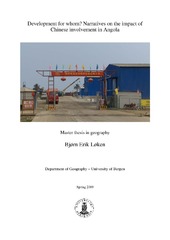Development for whom? Narratives on the impact of Chinese involvement in Angola
Master thesis
Permanent lenke
https://hdl.handle.net/1956/7301Utgivelsesdato
2009-05-15Metadata
Vis full innførselSamlinger
- Department of Geography [634]
Sammendrag
The rise of China challenges the unipolar world dominated by the West and the capitalism seen after the end of the cold war. Africa, in particular, has been dominated by the West during the last decades. The economic paradigms represented by the International Financial Institutions (IFIs), such as The World Bank and the International Monetary Fund (IMF) have been hegemonic, and politically and economically, Africa has been out of focus after the end of the Cold War. Currently, this situation seems to be changing as Africa again becomes a continent of interest (Melber 2007:6-7). After achieving peace in 2002, Angola rapidly improved its position in Africa. The many resources in the country provided a flying start for the government, and the economy is now growing steadily at rates of almost 20 percent each year. The Chinese involvement in Angola is easily noticed by the country's inhabitants, because a large of the involvement is in the public infrastructure sector. I experienced that most people living in Angola had clear perceptions about the Chinese involvement in Angola. Not all of these were very well founded, but Angola nonetheless represents a very interesting case study of the narratives on the Chinese involvement in Africa, precisely because the results are so visible. There has been produced several written accords concerning the Chinese entrance to Angola, as will be shown in the context chapter (chapter 4). Based on text analysis and the fieldwork in Angola in July/August 2008, the thesis will analyse how the narratives on the Chinese impact influence the actual development impact of China in Angola. The actors who form these narratives will be mapped, and the foundation which the narratives are based on will be analysed. Further on, the thesis will investigate why some of the existing narratives have been able to dominate the policies, while others have been marginalised. By studying this situation in a narrative perspective, I reach my goal of doing a study that contributes to the understanding of the changing power relations appearing as a result of the emergence of China as a modern superpower.
